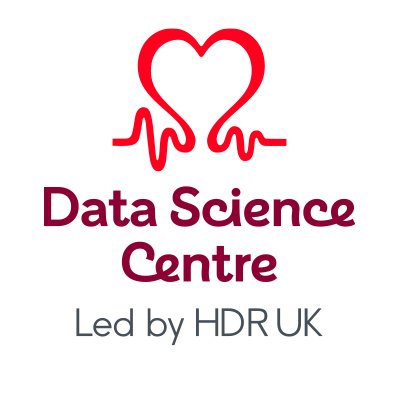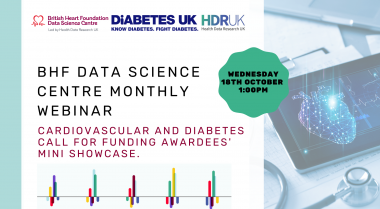Diabetes patients set to benefit from heart disease data investment
7 July 2022
People living with diabetes could be set to benefit from a major research initiative to untangle the link between diabetes and heart disease – two of the most pressing global health crises. The project – led by the British Heart Foundation (BHF) Data Science Centre – will enable researchers from across the UK to safely access health data sets, speeding up the search for better prevention and treatment of diabetes.

Health Data Research UK, the British Heart Foundation and Diabetes UK are pleased to announce our partnership for a new Diabetes Data Science Catalyst to harness the power of data to drive improvements in the treatment and prevention of diabetes, with associated reductions in cardiovascular disease.
Cardiovascular diseases are among the main causes of death in people with diabetes, but there are still many unanswered questions on the links between these diseases. The Diabetes Data Science Catalyst will enable data-driven research to help improve understanding of how diabetes and its risk factors increase the risk of cardiovascular diseases, like heart attack and stroke, ultimately working to improve patient care and save lives.
Building on established foundations
The partnership builds on the British Heart Foundation’s existing £10 million investment for the BHF Data Science Centre (BHF DSC), led by Health Data Research UK (HDR UK) in January 2020 to promote the safe and ethical use of data for research into the causes, prevention and treatment of all diseases of the heart and circulation.
As a key component of the BHF DSC, the Diabetes Data Science Catalyst will benefit from its expertise in using large-scale data for research, such as meaningfully involving the public in how their data is safely accessed and used, and addressing technical barriers in data-driven research.
Professor Cathie Sudlow, Director of the BHF DSC, said: “I’m thrilled to see the important work of the BHF DSC extend to patients with diabetes. By being embedded in the Centre, the Diabetes Data Science Catalyst will build on and inform our ongoing approaches to using large-scale data to improve health, as well as enable the cardiovascular and diabetes research communities to collaborate and answer key cardiometabolic research questions at pace.”
Putting patients first to reap big rewards
Graeme Smith, 47, was diagnosed with a heart attack in 2018 after experiencing pains at a music festival. During his stay in hospital, he discovered that he also had type 2 diabetes, which had damaged his cardiovascular system. Graeme now takes medication and keeps his eye on living healthily to manage his conditions, adding that he feels grateful for a ‘second chance’ at life.
“I had no obvious symptoms of type 2 diabetes, and the diagnosis came as a shock, especially after a heart attack. I am really pleased to see that researchers are taking this step to better understand the links between heart health and diabetes and I hope that the Diabetes Data Science Catalyst speeds up the search for new treatments.”
Professor Ewan Pearson, who will lead the project said: “As a doctor who has had the privilege of caring for patients, as well as conducting and enabling research studies that rely on large-scale patient data, I’m delighted to be leading this new partnership.
“It’s shocking that 590 heart attacks and 770 strokes are caused by diabetes every week in the UK. But this unique collaboration will enhance our knowledge of the links between the diseases; facilitate a deeper understanding of the causes and progression of diabetes as a major cardiovascular risk factor; and, most importantly, drive improvements in patient care to save lives.”
Creating a secure health data ecosystem
The Diabetes Data Science Catalyst will not hold any patient data. Instead, it will work with data-controllers to help researchers find, access, understand and connect the UK’s unique cardiometabolic ‘big data’ that is distributed across national registries, NHS electronic medical records and other relevant datasets.
Professor Andrew Morris, Director of HDR UK, said: “There are huge opportunities for this partnership to transform research into both diabetes and cardiovascular disease, from unlocking the potential of routinely collected NHS data, to applying cutting-edge analytic methods like artificial intelligence to this important area of health research.
“It’s key that this work underpinned by a secure and trustworthy health data infrastructure and informed by patients and the public, and we look forward to working with the Catalyst group to build and develop this to serve the needs of people with diabetes and cardiovascular disease.”
A new age of digital medicine
Professor Sir Nilesh Samani, Medical Director of the BHF, said: “At the BHF, we recognise the tremendous potential of data science as we enter a new age of digital medicine. That’s why we are delighted to be working with Diabetes UK and Health Data Research UK to launch the Diabetes Data Science Catalyst. The BHF and Diabetes UK share a common goal to reduce the burden of cardiovascular diseases in people living with diabetes and this new initiative will strengthen our ability to tackle this important problem.
“By unlocking the power of data, we will be able to better understand how diabetes increases the risk of developing deadly heart and circulatory conditions, and how we can save families from this heartbreak.”
Dr Elizabeth Robertson, Director of Research at Diabetes UK, said: “We’re delighted to be partnering with Health Data Research UK and the BHF Data Science Centre to launch the Diabetes Data Science Catalyst. The Diabetes Data Science Catalyst has the potential to enable data-driven research, yielding insights that will improve healthcare and move us closer to a future when cardiovascular disease is no longer among the leading causes of death in people with diabetes.
“By involving people with diabetes in this cutting-edge research, we’re confident that any changes in diabetes care resulting from this initiative will better support the needs of people living day-to-day with this relentless condition.”



